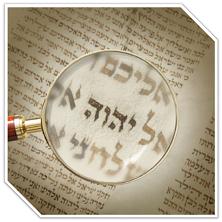The Belgic Confession of Faith Article 10 The Divinity of Christ
The Belgic Confession of Faith Article 10 The Divinity of Christ
Last time in discussing this article we made a few remarks about the Jehovah Witnesses, who, among others, deny the eternal Sonship of the Lord Jesus. The doctrine of the eternal Sonship of the Lord Jesus is of the greatest importance because of its relationship with the salvation of the church. Although we all believe that the Lord Jesus is eternal God with the Father and the Holy Ghost, we will nevertheless give a number of proofs from God's Word.
 First, a proof is in His Names. The Lord Jesus is called Jehovah or Lord, as we can read in Jeremiah 23:6, "And this is His name whereby He shall be called, THE LORD OUR RIGHTEOUSNESS." This is speaking of the Messiah, Who will execute judgment and justice in the earth. One of the great objections which the Jehovah Witnesses use is that the Lord Jesus is not called Jehovah. The name Lord is a word of authority, signifying a ruler or governor, and is applied to all three Divine Persons to the Father in Genesis 2:4, etc.; to the Son in Psalm 110:1 and Jeremiah 23:6; and to the Holy Spirit in 2 Thessalonians 3:5. These are just a few places which are mentioned.
First, a proof is in His Names. The Lord Jesus is called Jehovah or Lord, as we can read in Jeremiah 23:6, "And this is His name whereby He shall be called, THE LORD OUR RIGHTEOUSNESS." This is speaking of the Messiah, Who will execute judgment and justice in the earth. One of the great objections which the Jehovah Witnesses use is that the Lord Jesus is not called Jehovah. The name Lord is a word of authority, signifying a ruler or governor, and is applied to all three Divine Persons to the Father in Genesis 2:4, etc.; to the Son in Psalm 110:1 and Jeremiah 23:6; and to the Holy Spirit in 2 Thessalonians 3:5. These are just a few places which are mentioned.
In regard to the Son, we have mentioned two texts in the Old Testament. Do we find it also in the New Testament? We must not forget the Old Testament was written in the Hebrew language, and this is also true of the word Jehovah. The New Testament was written in Greek. When the name Kurios is used in Greek, it has the same meaning as the name Jehovah in Hebrew. Thus the Lord Jesus is called the Lord Christ in Colossians 3:24. In John 1:1 He is also called God: "In the beginning was the Word, and the Word was with God, and the Word was God." This speaks of the second Person in the Divine Being. Thomas said, "My Lord and my God" (John 20:28), and Paul testified, "And without controversy great is the mystery of godliness: God was manifest in the flesh." (1 Timothy 3:16). In Romans 9:5 the same apostle said, "And of Whom as concerning the flesh Christ came, Who is over all, God blessed for ever." Some of these texts we have mentioned before, but they are all proof of the Godhead of Christ in His Names.
Secondly, the Godhead of Christ can also be proved from His Divine Attributes. He is eternal. The prophet Micah, mentioned in our article, writes, "Whose goings forth have been from of old, from everlasting." (Micah 2:5). The apostle in Hebrews 7:3 says, "Having neither beginning of days, nor end of life." The Lord Jesus Himself said, "Before Abraham was, I am." (John 8:58).
He is omniscient. John 16:30, "Thou knowest all things." He is unchangeable. Malachi 3:6, "For I am the Lord, I change not." He is independent. John 5:26, "For as the Father has life in Himself: so hath He given to the Son to have life in Himself." He is omnipotent. Matthew 28:18, "All power is given unto Me in heaven and in earth." He is omnipresent. Matthew 18:20, "For where two or three are gathered together in My Name, there am I in the midst of them."
Thirdly, we can prove Christ's Divinity from His Works. We think first of the creation, as we find it expressed in Psalm 33:6, "By the Word of the Lord were heavens made." Consider also the work of upholding and governing, as stated in John 5:17, "My Father worketh hitherto, and I work." Think of how many miracles the Lord Jesus did during His stay on earth. He healed the blind, the lame, the leper, the deaf, and He raised the dead. He had power to lay down His life and to take it again.
These are things in nature, but there are also the works of grace, when He applies His merits to His church. He calls sinners, who are dead in sin and trespasses, to life, because He bought them with His own blood. He forgives them their sin, leads them on the way of sanctification, and at His time He brings them in eternal glory. At the last day He will call the quick and the dead before His judgment seat. All these works cannot be done by men, and are proof of Christ's Godhead.
Fourthly, the Honor which is given to Him is another proof. Baptism is administered in the Name of the Triune God, and the Lord does not give His honor to another. To believe in Him is necessary to salvation, "This is life eternal, that they might know Thee the only true God, and Jesus Christ, Whom Thou hast sent." (John 17:3). The Lord Jesus is also worshipped by angels and saints. Stephen prayed to Him, "Lord Jesus, receive my spirit." (Acts 7:59). This article of our confession ends with, "He therefore is that true, eternal, and almighty God, Whom we invoke, worship and serve."
 In our days there is much spoken about Jesus and taught that we must go to Him. This is good advice if it is brought in the right way. But what can we do with Jesus if we have never become a sinner before God? We must see that we are a sinner, which we will only see by the administration of the Holy Spirit. God requires satisfaction of His justice by keeping the Law and by payment of our debt. In this way we become worthy of condemnation and unworthy of the least of His blessings. When we can no longer help ourselves, then we may see by Word and Spirit that the Son of God exists, and in Him there is a way to be saved. The Jehovah Witnesses may say that Christ's ransom does not guarantee everlasting life, but at that time it becomes reality for such a poor sinner, that which God's Word teaches in John 1:12, John 3:16, and Acts 16:31: those who believe in the Lord Jesus will be saved.
In our days there is much spoken about Jesus and taught that we must go to Him. This is good advice if it is brought in the right way. But what can we do with Jesus if we have never become a sinner before God? We must see that we are a sinner, which we will only see by the administration of the Holy Spirit. God requires satisfaction of His justice by keeping the Law and by payment of our debt. In this way we become worthy of condemnation and unworthy of the least of His blessings. When we can no longer help ourselves, then we may see by Word and Spirit that the Son of God exists, and in Him there is a way to be saved. The Jehovah Witnesses may say that Christ's ransom does not guarantee everlasting life, but at that time it becomes reality for such a poor sinner, that which God's Word teaches in John 1:12, John 3:16, and Acts 16:31: those who believe in the Lord Jesus will be saved.
Blessed is the boy or girl who becomes unhappy by the sin which is committed, but who may also learn that for Christ's sake we can be saved. They may then learn with the spouse, "He is altogether lovely." (Song of Solomon 5:16).

Add new comment